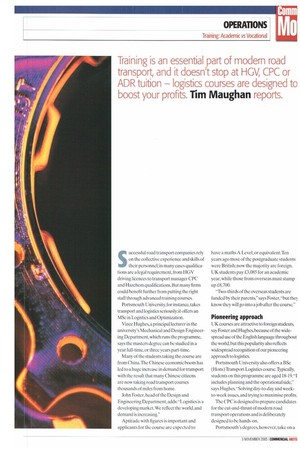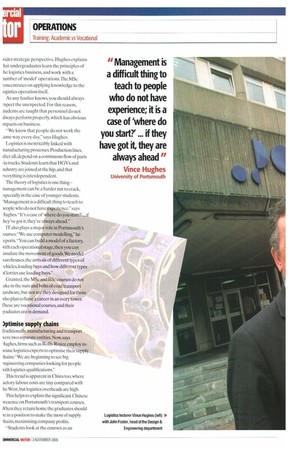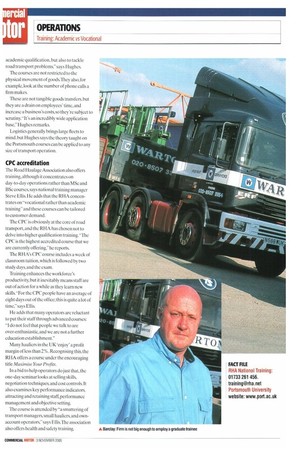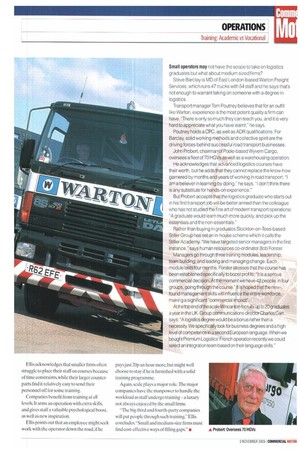Training is an essential part of modern road transport, and
Page 53

Page 54

Page 56

Page 57

If you've noticed an error in this article please click here to report it so we can fix it.
it doesn't stop at HGV, CPC or ADR tuition — logistics courses are designed to boost your profits. Tim Maughan reports.
Successful road transport companies rely on the collective experience and skills of their personnel; in many cases qualifications are a legal requirement, from HGV driving licences to transport manager CPC and Hazchem qualifications. But many firms could benefit further from putting the right staff through advanced training courses.
Portsmouth University, for instance, takes transport and logistics seriously; it offers an MSc in Logistics and Optimization.
Vince Hughes, a principal lecturer in the university's Mechanical and Design Engineering Department, which runs the programme, says the masters degree can be studied in a year full-time, or three years part-time.
Many of the students taking the course are from China.The Chinese economic boom has led to a huge increase in demand for transport with the result that many Chinese citizens are now taking road transport courses thousands of miles from home.
John Foster, head of the Design and Engineering Department, adds: 'Logistics is a developing market. We reflect the world, and demand is increasing."
Aptitude with figures is important and applicants for the course are expected to have a maths A Level, or equivalent.Ten years ago most of the postgraduate students were British; now the majority are foreign. UK students pay £3,085 for an academic year, while those from overseas must stump up £8,700.
"Two-thirds of the overseas students are funded by their parents," says Foster," but the know they will go into a job after the course."
Pioneering approach
UK courses are attractive to foreign students, say Foster and Hughes, because of the widespread use of the English language throughout the world, but this popularity also reflects widespread recognition of our pioneering approach to logistics.
Portsmouth University also offers a BSc (Hons) Transport Logistics course. Typically. students on this programme are aged 18-19.'1 includes planning and the operational side," says Hughes. "Solving day-to-day and weekto-week issues, and trying to maximise profits.
The CPC is designed to prepare candidates for the cut-and-thrust of modern road transport operations and is deliberately designed to be hands-on.
Portsmouth's degrees, however, take on a wider strategic perspective. Hughes explains hat undergraduates learn the principles of he logistics business, and work with a lumber of 'model' operations.The MSc :oncentrates on applying knowledge to the ogistics operation itself.
As any haulier knows, you should always :xpect the unexpected. For this reason, Audents are taught that personnel do not ilways perform properly, which has obvious mpacts on business.
"We know that people do not work the ;arm way every day," says Hughes.
Logistics is inextricably linked with nanufacturing processes. Production lines, tfter all, depend on a continuous flow of parts ha trucks. Students learn that HGVs and ndustry are joined at the hip, and that werything is interdependent.
The theory of logistics is one thing — nanagement can be a harder nut to crack, :specially in the case of younger students. 'Management is a difficult thing to teach to vople who do not have experie nee." says -Iughes."It's a case of 'where do you start?... if hey've got it, they're always ahead."
IT also plays a major role in Portsmouth's :ourses,"We use computer modelling," he .eports."You can build a model of a factory vith each operational stage, then you can .imulate the movement of goods.We model varehou.ses, the arrivals of different types of iehicles, loading bays and how different types )f lorries use loading bays."
Granted, the MSc and BSc courses do not ake in the nuts and bolts of road transport iardware, but nor are they designed for those vho plan to have a career in an ivory tower. [hese are vocational courses, and their ;raduates are in demand.
3ptimise supply chains Eraditionally,manufacturing and transport vere two separate entities. Now, says -Iughes, firms such as Rolls-Royce employ inlouse logistics experts to optimise their supply :hains:" We are beginning to see big :ngineering companies looking for people vith logistics qualifications."
This trend is apparent in China too, where actory labour costs are tiny compared with he West, but logistics overheads are high.
This helps to explain the significant Chinese wesence on Portsmouth's transport courses. When they return home the graduates should )e in a position to make the most of supply :hair's, maximising company profits.
"Students look at the courses as an academic qualification, but also to tackle road transport problems," says Hughes.
The courses are not restricted to the physical movement of goods.They also, for example, look at the number of phone calls a firm makes.
These are not tangible goods transfers, but they are a drain on employees' time, and increase a business's costs, so they're subject to scrutiny."It's an incredibly wide application base,Hughes remarks.
Logistics generally brings large fleets to mind, but Hughes says the theory taught on the Portsmouth courses can be applied to any size of transport operation.
CPC accreditation
The Road Haulage Association also offers training, although it concentrates on day-to-day operations rather than MSc and BSc courses, says national training manager Steve Ellis. He adds that the RHA concentrates on "vocational rather than academic training" and these courses can be tailored to customer demand.
The CPC is obviously at the core of road transport, and the RHA has chosen not to delve into higher qualification training. 'The CPC is the highest accredited course that we are currently offering," he reports.
The RHA's CPC course includes a week of classroom tuition, which is followed by two study days, and the exam.
Training enhances the workforce's productivity, but it inevitably means staff are out of action for a while as they learn new skills. "For the CPC people have an average of eight days out of the office; this is quite a lot of time," says Ellis.
He adds that many operators are reluctant to put their staff through advanced courses: "I do not feel that people we talk to are over-enthusiastic, and we are not a further education establishment."
Many hauliers in the UK 'enjoy' a profit margin of less than 2%. Recognising this, the RHA offers a course under the encouraging title Maximise Your Profits.
In a bid to help operators do just that, the one-day seminar looks at selling skills, negotiation techniques, and cost controls. it also examines key performance indicators, attracting and retaining staff, performance management and objective setting.
The course is attended by "a smattering of transport managers, small hauliers, and ownaccount operators," says Ellis.The association also offers health and safety training. Ellis acknowledges that smaller firms often struggle to place their staff on courses because of time constraints, while their larger counterparts find it relatively easy to send their personnel off for some training.
Companies benefit from training at all levels. It arms an operation with extra skills, and gives staff a valuable psychological boost, as well as new inspiration.
Ellis points out that an employee might seek work with the operator down the road, if he paysjust 20p an hour more, but might well choose to stay if he is furnished with a solid training programme.
Again, scale plays a major role. The major companies have the manpower to handle the workload as staff undergo training —a luxury not always enjoyed by the small firms.
"The big third and fourth-party companies will put people through such training,Ellis con cludes."Small and medium-size firms must find cost-effective ways of filling gaps." •










































































































































































































